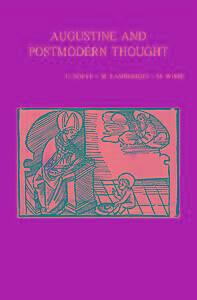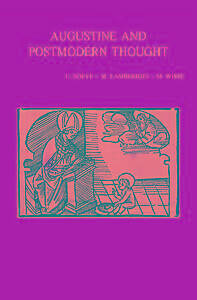
- Retrait gratuit dans votre magasin Club
- 7.000.000 titres dans notre catalogue
- Payer en toute sécurité
- Toujours un magasin près de chez vous
- Retrait gratuit dans votre magasin Club
- 7.000.0000 titres dans notre catalogue
- Payer en toute sécurité
- Toujours un magasin près de chez vous
80,00 €
+ 160 points
Description
On November 9-11, 2006, the Research Group 'Theology in a Postmodern Context' (K.U.Leuven) organised an expert symposium on the return of Augustine in current postmodern philosophical-theological debates. The North-African Church Father, or at least the thinking patterns or intuitions borrowed from him, are often invoked in discussions on the relation between Christian faith and the contemporary postmodern context. On the one hand, one observes the retrieval of rather premodern approaches in order to remedy the so-called (post-)modern crisis, which is said to result in nihilism, relativism, etc. For what seems to attract some theologians in Augustinian thinking is the (apparent) marriage between Greek (neo-Platonic) philosophy and Christian faith. Such a combination of premodern metaphysics and Christian faith would serve as a necessary presupposition for every legitimate theological epistemology. On the other hand, there are theologians and philosophers who are increasingly trying to reread Augustine from a postmodern stance, stressing the role of particularity, narrativity, historicity, and the decentring of subjectivity, which they see present in Augustine's approach, or from which they deconstruct Augustine's thinking. Central questions discussed during the symposium were: Are the analyses, offered by authors who are re-introducing Augustine with respect to the contemporary context, correct? To what diagnosed problems, and on what basis, do they propose Augustine as a remedy? Are their presentations of other theological and philosophical responses to the present situation correct and which 'Augustine' do they claim to represent? More fundamentally: what would a genuine Augustinian epistemology look like, and what can we gain from it? In what way can it be normative for a theological epistemology in our day? In answering these questions, the symposium focused explicitly on contemporary philosophical and theological evaluations of both modernity and postmodernity, and theological responses to them.
Spécifications
Parties prenantes
- Auteur(s) :
- Editeur:
Contenu
- Nombre de pages :
- 277
- Langue:
- Anglais
- Collection :
- Tome:
- n° 219
Caractéristiques
- EAN:
- 9789042921207
- Date de parution :
- 29-05-09
- Format:
- Livre broché
- Format numérique:
- Trade paperback (VS)
- Dimensions :
- 163 mm x 239 mm
- Poids :
- 521 g

Les avis
Nous publions uniquement les avis qui respectent les conditions requises. Consultez nos conditions pour les avis.






